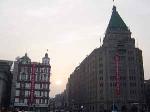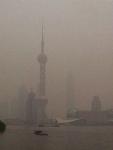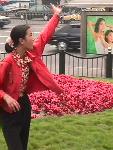- Getting around Lijiang. Dont stay in the Old Towns more than 2 days, there is nothing to do. KRISS Oct 9, 2013 05:46
- 2013 Beijing Temple Fair BENNYLAU Feb 26, 2013 03:29
- Malaysian traveling from KUL - LAX vis Shanghai PVG ZATI_DY Jan 3, 2013 20:15
Echoes of Jazz and Decadence - Part Two
- Views: 4739
- |Vote: 0 0
- |Add to Favorites
- |Recommend to Friends
The Cathay
At the centre of the Bund is the old Cathay Hotel, now called the Peace, which has long been the symbol of everything decadent about Shanghai. A century ago, the spiritual arteries of Shanghai were giddy with toxins: countless brothels and opium dens neighboured gambling houses supervised by an emerging Black Society. Wealthy Chinese were ruined there, and the poor were exploited as coolies, ever subservient to the Japanese Bluecoats, British Tommies and American Navy boys, all boozing their way through wretched whorehouses, undoing China's lost and beautiful daughters. The Cathay was where foreign aristocrats, celebrities and wealthy traders could take champagne and watch the splendid decay from behind high glass windows. It was an opulent palace of the abhorrently immoral, the creation of a British Iraqi weapons & drug baron called Victor Sassoon, whose criminal empire had subjected much of the city. The guests of the hotel, however, preferred to remain oblivious to their responsibility for the moral chaos outdoors, instead spending their evenings getting tipsy and swaying in frivolous dance to the nightly jazz performances in the parlour. Walking past the Peace hotel, I could almost hear the jazz strains echoing still across the marblework, anthem to a freedom for Westerners based on the humiliation and degradation of the Chinese. Nowadays a jazz band still plays there in evening shows that wistfully reinvent the history of the hotel, evoking imaginary lost days of former glory. Tourists who come to listen are probably unaware that for every brick upon which the jazz swiftly reverberates and plays, there is a whole Chinese family lost to opium. They had no choice in their addiction: when the Chinese tried to refuse the import of opium, British ships shelled Chinese ports until they accepted the trade.
After liberation in 1949, the performance of jazz had been banned until, in the 90's, Shanghai began to invite the foreigners back. In opening her economy, China has reversed track once again, attempting to repair years of insularity and foreign distrust. But in doing so, China has had to face again the arrogance of a league of presuming foreign faces. Now, Shanghai hopefuls idolise foreign countries with two-car families and two-storey houses filled with gaudy trinkets, and forget that the foreigners of those lands spent centuries removing this wealth from Chinese shores, loaded onto galleys moored at the Bund, and imported in return the opium that their great-grandfathers wasted themselves on. Ask any of these young disciples of the West who is to blame for China's slow development, and they will point to their own people for not being 'open minded' enough. Nowadays in Shanghai, the most coveted jobs are in those companies owned by foreigners, attracted to doing business in China by the prospect of cheap labour. Once again, the value taken out exceeds the value returned. The graduates who take these jobs are grateful for the advantage over other Chinese job seekers. But the party most disadvantaged is still China Herself.
Fog Over the Huangpu River
We checked into another old, stately hotel now renovated to include backpacker accommodation, the Pujiang, formerly known as the Astor. The foyer retains the pompous colonial ostentation of the time when it was built, high ceilings and dark wooden panelling, chandeliers and pillars. We booked a dorm and took the old lift and winding corridors and a thin, out-of-the-way staircase up to the room, where a few other unshaven European travellers were reading thick travel guides on the bunks. I was exhausted and was pleased to find an adjacent bathroom, tiled over in white, with a bathtub. There was no plug, but Steve discovered that the water glasses in our room fit snugly into the hole, so I ran the piping hot water and locked myself in. I stripped as the room filled up with steam and opened the window a crack to look outside. It was a foggy morning, and I could see over the sloping roofing of the hotel, across over the neighbouring Russian embassy, also of colonial design, and through the thick mist over the Huangpu River of the Yangtse Delta. In the fog, I could just make out the orbs of the Oriental Pearl Tower on the distant bank; otherwise, there was nothing to distinguish the scene from that of a century gone by, and little to distinguish me from a British guest who might have bathed himself then, in that room, himself too looking out over the river in the mist. I lay in the hot bath, trying not to kick out the glass tumbler in the plughole, and wondered about the attitudes towards the Orient of my grandfather's time, and how much of my own passion for China perhaps resembled them.
The East has always been exoticised for Westerners, represented as a strange and mysterious continent of unfathomable mystery. Centuries after it came about, this rather simplistic myth still holds power in the Western world. We still depict China as being populated by wizened old men and subservient girls in pigtails, and we still regard a Westerner's ability to use chopsticks as a sign of erudition. In travelling through China, I had resolved to be open to the reality of the country rather than impose my own preconceptions, and so I am as uncomfortable with exoticised accounts as I am with uninformed criticism of China. Indeed, the most striking aspect of all of my experiences in China was that there was never anything that seemed especially incomprehensible about life there. Both Westerners and Chinese like to assume that a foreigner can never truly understand Chinese culture - this is patently untrue. Different circumstances give rise to different cultures, and understanding between nations requires much patience. But there is nothing that can be done by humankind that cannot strike a harmonic in a foreign heart that comes to learn. Those who can't understand are those who just can't see the real value in trying.
Throughout my travels in China, people had stared at me as I passed, sometimes with surprise, sometimes with envy, and at times with disapproval. At times I had been seen as an opportunity, but I was rarely seen as just another man. I never liked being looked at, but in a way I felt it was deserved, for I am ultimately a product of a civilisation that has caused China great disadvantage. There were times when I wanted to apologise for my own privilege: but there, soaking in a steaming hot bath in a century-old hotel, I was enjoying yet another luxury at a cost that seemed inexpensive to me, but was unaffordable to most Chinese.
The only defense I could make was in my study of the Chinese language. In my mind at least, to attempt the language of the place you have travelled to is a mark of respect. I had taught English at Guan Ya in Shenyang, and if I had not made a genuine attempt to study Chinese as well, I would have been just another one of the troops keeping up the work of the colonists who wanted to make everywhere England.
I respect linguists, they're useful in that they can open real channels between otherwise isolated cultures. To learn a language is really to take away from oneself some of the ignorance that is the root of friction between nations.
Tossing Butterflies
A while later, Steve and I were back on the Bund and ready to take a closer look at the city. I had to admit that I knew more about the history of Shanghai than I did about the city as it is today, and neither of us had much of a clue on what we wanted to see there. After half an hour of wandering along the riverside dodging hawkers selling knick-knacks of no value whatsoever, we sat resting near a flower garden at the roadside, looking again at the line of European facades. The garden was near a large air conditioning duct that sucked fresh air into the car tunnel beneath the rivers. The grate over the duct was covered with what looked like little white flowers - and two young girls were leaning over it picking them off. On closer inspection, the white flowers turned out to be butterflies trapped by the airflow. The girls were gently lifting the butterflies by the wing and tossing them into the air.
We headed for Nanjing Road, the main shopping mall of Shanghai, hot and teeming with tourists. The side streets proved to have more character, but we decided to get on the subway and head further out in search of the French quarter, which a guidebook had described as very picturesque. We were not sure we'd got off at the right station, and couldn't see anything particularly endearing about the buildings in the area which may or may not have been the site of the old French colony in Shanghai, and so we instead tried to walk our way back towards the river. We were a couple of hours in wandering through the streets: it may have been seen as wasted tourism, but we tried to enjoy something of the pulse of genuine Shanghai. Long, grey avenues stretched out in the shadow of countless motorway overpasses. It became clear very quickly that Shanghai is far too massive to be appreciated in such a casual manner.
*** To Be Continued ***






 Copyright © 1998-2026 All rights reserved.
Copyright © 1998-2026 All rights reserved.